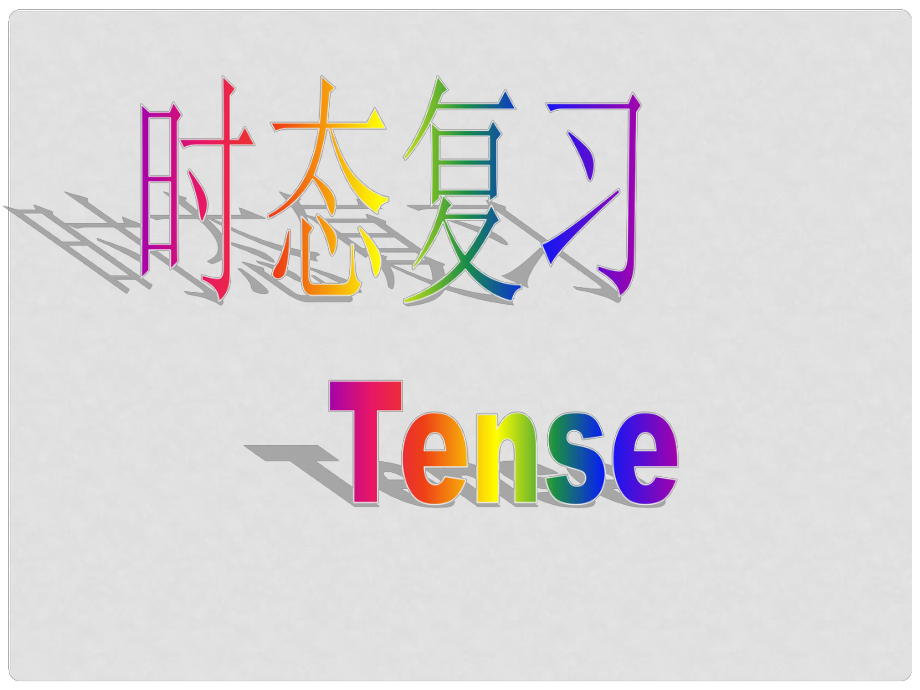《廣東省佛山市順德區(qū)江義初級(jí)中學(xué)九年級(jí)英語(yǔ)上冊(cè)《Module 1 Unit 3 Language in use》課件 (新版)外研版》由會(huì)員分享�����,可在線閱讀��,更多相關(guān)《廣東省佛山市順德區(qū)江義初級(jí)中學(xué)九年級(jí)英語(yǔ)上冊(cè)《Module 1 Unit 3 Language in use》課件 (新版)外研版(24頁(yè)珍藏版)》請(qǐng)?jiān)谘b配圖網(wǎng)上搜索�����。
1�、1.I visited the Giants Causeway two years ago.2. It produces electricity for millions of people in China.3. Ive never seen it , so Im not sure I agree with you.4. I looked to the east the sky was becoming grey.5. Youll get there in five minutes.6. Am I going the right way.一般現(xiàn)在時(shí)一般現(xiàn)在時(shí)一般過(guò)去時(shí)一般過(guò)去時(shí)一般將來(lái)時(shí)一般
2、將來(lái)時(shí)現(xiàn)在進(jìn)行時(shí)現(xiàn)在進(jìn)行時(shí)過(guò)去進(jìn)行時(shí)過(guò)去進(jìn)行時(shí)現(xiàn)在完成時(shí)現(xiàn)在完成時(shí)注意:一般現(xiàn)在時(shí)一般現(xiàn)在時(shí)一��、概念:二��、謂語(yǔ)動(dòng)詞形式:三、常用時(shí)間狀語(yǔ):一般現(xiàn)在時(shí)表示經(jīng)常性或習(xí)慣性的反復(fù)發(fā)生的動(dòng)作�。說(shuō)明某一事物的狀態(tài)或特征����?;蛎枋隹陀^事實(shí)或普遍真理等�。do/doesoften; always; sometimes; every day; usually����,at weekends , on Saturdays , once a month 如果主語(yǔ)是第三人稱單數(shù)形式,謂語(yǔ)動(dòng)詞如果主語(yǔ)是第三人稱單數(shù)形式��,謂語(yǔ)動(dòng)詞要用第三人稱單數(shù)形式,如果主語(yǔ)是其他人稱���,要用第三人稱單數(shù)形式,如果主語(yǔ)是其他人稱�,則謂語(yǔ)單詞用動(dòng)詞原
3����、形���。則謂語(yǔ)單詞用動(dòng)詞原形��。1. Henry will give us a report as soon as he _. (2013 河北) A. arrives B. arrived C. is arriving D. will arrive2. My grandmother _ in Yangzhou. She was born there and has never lived anywhere else. (2013 揚(yáng)州) A. lived B. lives C. was living D. will live一般過(guò)去時(shí)一般過(guò)去時(shí)一��、概念:二��、謂語(yǔ)動(dòng)詞形式:三��、常用時(shí)間狀語(yǔ):表示過(guò)去
4�、某個(gè)時(shí)間發(fā)生的動(dòng)作或存在的狀態(tài)���。eg. He went to the park yesterday.他昨天去公園了���。didyesterday, last year , two days ago , a minute ago, just now , in 1990 注意: 在一般過(guò)去時(shí)里謂語(yǔ)動(dòng)詞用過(guò)去式。在一般過(guò)去時(shí)里謂語(yǔ)動(dòng)詞用過(guò)去式�。1. Have you had your breakfast yet? Yes. Mom _ it for me. (2013 蘭州) A. was cooking B. is cooking C. will cook D. cooked一般將來(lái)時(shí)一般將來(lái)時(shí)一��、概
5、念:二�����、謂語(yǔ)動(dòng)詞形式:三����、常用時(shí)間狀語(yǔ):四���、注意:表示在將來(lái)某個(gè)時(shí)間要發(fā)生的事情、行為或發(fā)生表示在將來(lái)某個(gè)時(shí)間要發(fā)生的事情���、行為或發(fā)生的事情���,行為或未來(lái)的狀態(tài)。的事情���,行為或未來(lái)的狀態(tài)。will do;或或be going to do tomorrow,next week, in the future,in two days,from now on,this month/ evening/afternoon 1.be going to do 表示計(jì)劃表示計(jì)劃,打算做某事打算做某事(強(qiáng)調(diào)計(jì)劃性強(qiáng)調(diào)計(jì)劃性)will do,表示將要做某事表示將要做某事(強(qiáng)調(diào)個(gè)人意愿或想法強(qiáng)調(diào)個(gè)人意愿或想法)1. M
6��、r. Green, a famous writer, _ our school next week. (2013 北京) A. visited B. visits C. was visiting D. will visit注意:注意:there be結(jié)構(gòu)的一般將來(lái)時(shí)常用結(jié)構(gòu)的一般將來(lái)時(shí)常用There is /are going to be或或There will be表表示���。示。e.g. There is going to / will be a film this evening. 今晚將有一場(chǎng)電影��。今晚將有一場(chǎng)電影?�,F(xiàn)在進(jìn)行時(shí)現(xiàn)在進(jìn)行時(shí)一�、概念:二��、謂語(yǔ)動(dòng)詞形式:三�、常用時(shí)間狀語(yǔ):四���、注意
7、: 還可以表示已經(jīng)安排好的將會(huì)進(jìn)行的活動(dòng)或行還可以表示已經(jīng)安排好的將會(huì)進(jìn)行的活動(dòng)或行為為.we are having a meeting tomorrow. 我們明天會(huì)開(kāi)會(huì)���。我們明天會(huì)開(kāi)會(huì)�。表示現(xiàn)在或現(xiàn)階段正在發(fā)生的事情或正在進(jìn)行的表示現(xiàn)在或現(xiàn)階段正在發(fā)生的事情或正在進(jìn)行的動(dòng)作動(dòng)作am/is/are +doing now, these days,或或 look , listen 等提示性的動(dòng)詞等提示性的動(dòng)詞 1. Millie, where is Miss Li? (2013 南京) She _ a speech on Chinese art to the first-year student
8�����、s in the hall. A. gives B. gave C. is giving D. has given過(guò)去進(jìn)行時(shí)過(guò)去進(jìn)行時(shí)一���、概念:二、謂語(yǔ)動(dòng)詞形式:三��、常用時(shí)間狀語(yǔ):四、注意: 過(guò)去進(jìn)行時(shí)和要有兩個(gè)時(shí)間����,一個(gè)是過(guò)去�����,一過(guò)去進(jìn)行時(shí)和要有兩個(gè)時(shí)間�,一個(gè)是過(guò)去���,一個(gè)是具體的��,在判斷時(shí)要看準(zhǔn)�����。個(gè)是具體的��,在判斷時(shí)要看準(zhǔn)。表示過(guò)去某段時(shí)間內(nèi)正在發(fā)生的事情或行為I was cooking when my friend Jenny phoned me. 當(dāng)珍妮打電話給我時(shí)我正在做飯�����。was/were +doing at yesterday , at that time 1. Linda, I
9����、called you this morning, but nobody answered the phone. Im sorry. I _ football with my friends then. (2013 菏澤) A. play B. played C. am playing D. was playing2. Sally took a photo of her friends while they _ computer games. (2013 杭州) A. playB. are playing C. have playedD. were playing現(xiàn)在完成時(shí)現(xiàn)在完成時(shí)一���、概念:二
10�、��、謂語(yǔ)動(dòng)詞形式:三��、常用時(shí)間狀語(yǔ): 表示過(guò)去發(fā)生或已經(jīng)完成的某一動(dòng)作�����,強(qiáng)調(diào)對(duì)現(xiàn)在表示過(guò)去發(fā)生或已經(jīng)完成的某一動(dòng)作,強(qiáng)調(diào)對(duì)現(xiàn)在造成的影響或結(jié)果�。造成的影響或結(jié)果���。Has he finished reading the book?have/has +done already, ever, never , before , just, yet , so far since +時(shí)間點(diǎn),for +時(shí)間段,in the past few years, 四�����、注意:四���、注意:一�、當(dāng)句子出現(xiàn)for+一段時(shí)間; since +過(guò)去時(shí)間點(diǎn), 我們一定要看看動(dòng)詞是否是短暫性動(dòng)詞�,如果是 必須把做以下調(diào)整:(題目要求保
11���、留for+一段時(shí)間; since +過(guò)去時(shí)間點(diǎn))把buy (bought)-had(擁有擁有)把borrow (borrowed)-kept(保存)、其余的動(dòng)詞基本改成:been(是是)+形容詞形容詞(been dead)二���、have/has been to ,have/has gone to 與have/has been in 的區(qū)別 have/has been to 表示去過(guò)某地���,目前已經(jīng) 回來(lái). He has been to Guangzhou.他去過(guò)廣州。 have/has gone to 表示去了某地���,目前還 未回來(lái)。 He has gone to Guangzhou.他去了廣州。
12��、have/has been in 表示一直在某地(可持續(xù)) He has been in Guangzhou.他一直在廣州。1. A number of tourists _ Yangzhou many times because it is such a beautiful city. (2013 揚(yáng)州) A. have been to B. has been to C. has gone to D. have gone to2. Miss Lin _ a lot of work for the poor area since 2010. (2013 北京) A. does B. did C
13�����、. has done D. will do各種時(shí)態(tài)中一般疑問(wèn)句和否定句的構(gòu)各種時(shí)態(tài)中一般疑問(wèn)句和否定句的構(gòu)成成 (以以do為例為例):1. 一般現(xiàn)在時(shí)一般現(xiàn)在時(shí)一般疑問(wèn)句式:一般疑問(wèn)句式:Do I / we / you / they +do ?Does he / she / it + do ?否定句式:否定句式: I / We /You / They +do not (dont) + do He / She / It does not (doesnt) + do 2. 一般過(guò)去時(shí)一般過(guò)去時(shí)一般疑問(wèn)句式:一般疑問(wèn)句式:Did I / we / you / he / she / it / they
14、 +do ?否定句式:否定句式:I / We /You / He / She / It / They +did not (didnt) + do 3. 現(xiàn)在進(jìn)行時(shí)現(xiàn)在進(jìn)行時(shí)一般疑問(wèn)句式:一般疑問(wèn)句式:Am I doing ?Are we / you / they +doing ?Is he / she / it + doing ?否定句式:否定句式: I am not (Im not) doingWe /You / They +are not (arent) + doingHe / She / It is not (isnt) + doing4. 過(guò)去進(jìn)行時(shí)過(guò)去進(jìn)行時(shí)一般疑問(wèn)句式:一般疑問(wèn)句式
15�、:Were we / you / they + doing?Was I / he / she / it + doing?否定句式:否定句式: We /You / They +were not (werent) + doing I / He / She / It was not (wasnt) + doing 5. 一般將來(lái)時(shí)一般將來(lái)時(shí)一般疑問(wèn)句式:一般疑問(wèn)句式:Will I / we / you / he / she / it / they + do ?Am I going to + do ?Are we / you / they + going to + do ?Is he / she /
16�、it + going to + do ?否定句式:否定句式: I / We / You / He / She / It / They + will not (wont) + do I am not (Im not) going to + do We / You / They + are not (arent) going to + do He / She / It is not (isnt) going to + do 6. 現(xiàn)在完成時(shí)現(xiàn)在完成時(shí)一般疑問(wèn)句式:一般疑問(wèn)句式:Have I / we / you / they + done?Has he / she / it + done?否定句式:否定句式:I / We / You / They have not (havent) +doneHe / She / It +has not (hasnt) + done
 廣東省佛山市順德區(qū)江義初級(jí)中學(xué)九年級(jí)英語(yǔ)上冊(cè)《Module 1 Unit 3 Language in use》課件 (新版)外研版
廣東省佛山市順德區(qū)江義初級(jí)中學(xué)九年級(jí)英語(yǔ)上冊(cè)《Module 1 Unit 3 Language in use》課件 (新版)外研版

